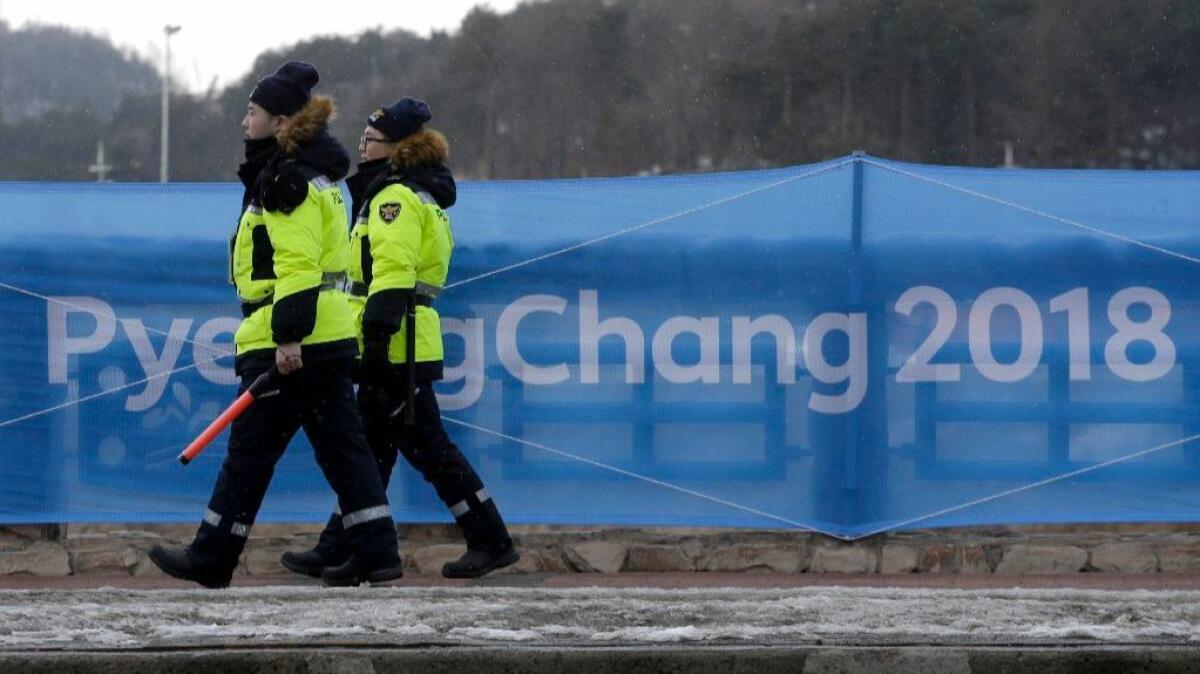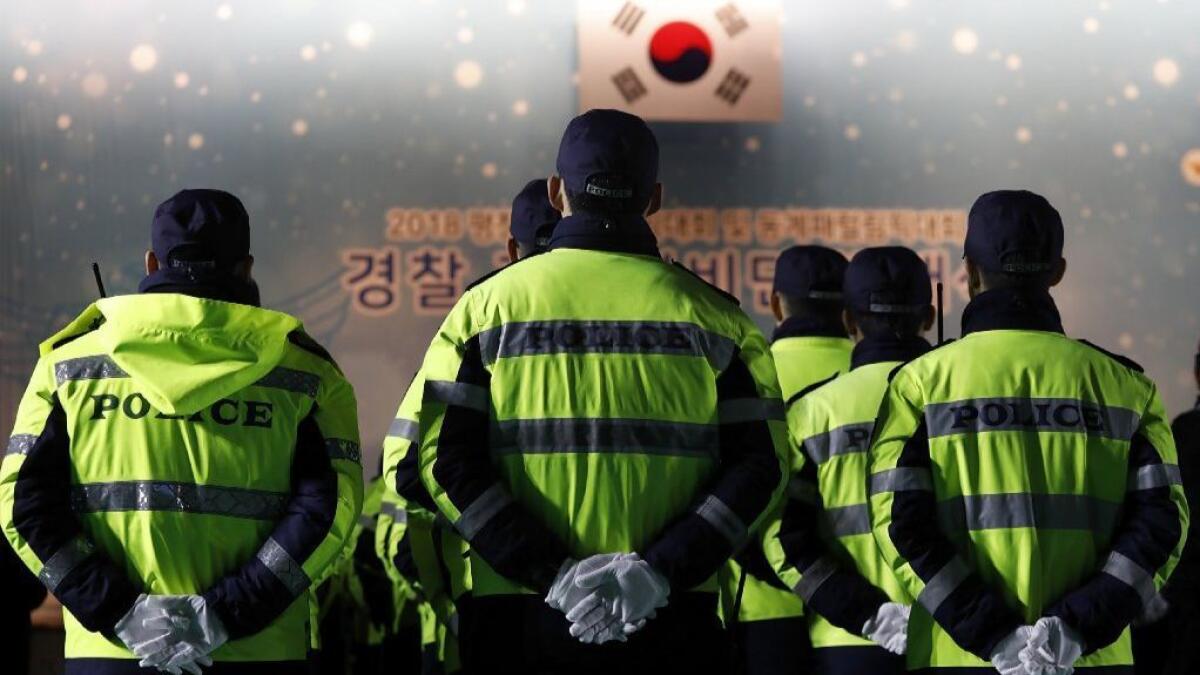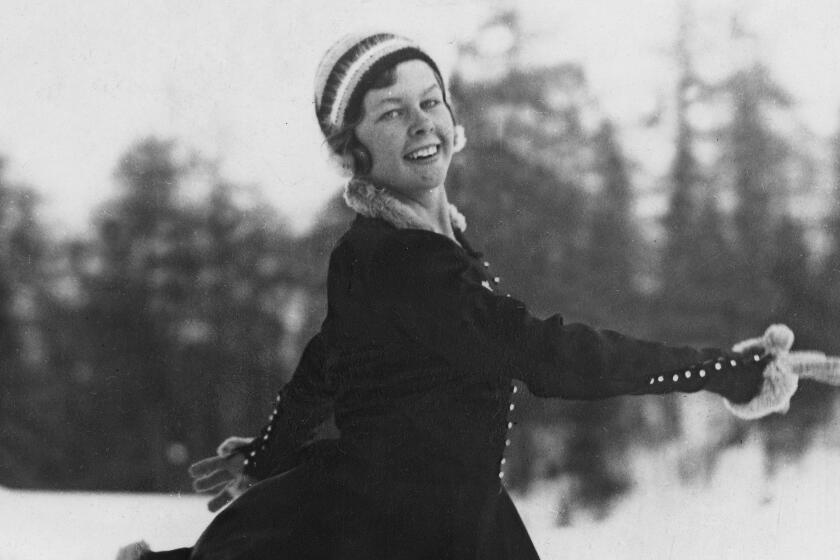Pyeongchang Olympics present more security threats than usual, but athletes and fans have reason for hope

Reporting from Pyeongchang, South Korea — Fighter jets streaked over the mountains that winter day. The snowboarders recall them roaring past every 15 minutes or so.
Many of the top names in snowboard cross racing had gathered in Pyeongchang in early 2016 to test the course that would be used for the 2018 Winter Olympics.
At some point, after the jets zoomed past yet again, American boarder Nate Holland turned to teammate Seth Wescott.
“Dude, I just want you to know I love you,” he recalls saying. “Like, if this trips off right now, we’re in a horrible spot.”
Barely 50 miles separate Pyeongchang’s mountain venues from the Demilitarized Zone, a swath of land that for decades has provided a tenuous buffer between North and South Korea. This proximity puts the Games at the center of a potential nuclear face-off.
But the political climate here — unlike the frigid weather — has warmed in recent weeks.
North Korea agreed to participate in the Olympics, sending a contingent of 22 athletes across the border. At the same time, angry rhetoric eased between the nation’s leader, Kim Jong Un, and President Trump.
With thousands of South Korean national police saturating the Pyeongchang area, officers standing on street corners in bright yellow coats, the question is: Do these Games still pose a security risk? And if so, what is the biggest potential threat?
“The Games are like the Super Bowl in a way,” says Steven Weber, a University of California professor who studies international politics. “They will always be a target.”

The specter of violence has shadowed this international sporting event since the “Munich Massacre” of 1972, when Palestinian gunmen stormed the Israeli team’s living quarters in an attack that ultimately left 11 hostages and a German police officer dead.
More recently, London went on alert during the 2012 Summer Olympics, and a Chechen rebel leader called for militants to “do their utmost to derail” the 2014 Winter Games in Sochi, Russia.
Both competitions went off safely, but when athletes and fans arrived at the 2016 Summer Games in Rio de Janeiro, they faced a different sort of worry — the Zika virus outbreak.
“Almost every Olympics has some kind of scandal or security threat or something that everybody’s talking about,” veteran luger Erin Hamlin said. “So I’ve been through it before.”
Tensions on the Korean peninsula began to ease on New Year’s Day when Kim made a public overture that was well-received by South Korean President Moon Jae-in.
South Korea is in a part of the world where you have ISIS and Al-Qaeda spinoffs in the Philippines and Indonesia. It’s not an isolated, safe place.
— Steven Weber, a University of California professor who studies international politics
Last-minute negotiations led to deal by which North Korea will compete in several sports and march with South Korea at the opening ceremony on Friday. The nations also will field a joint women’s hockey team.
All of this was welcome news for IOC President Thomas Bach, who spoke at a Sunday news conference about the “positive messages” he has received from both governments.
“We are very happy with the development on this front,” he said.
Not that everything has gone smoothly. There has been backlash in the South, where much of the population remains distrustful of Kim and protesters recently burned his image in the streets. North Korea canceled a joint cultural event and changed the date of a military parade in its capital, Pyongyang, to the day before the Games begin.
“There is no pretending that’s a coincidence,” said Tim Powdrill, an associate director with Risk Advisory, a London-based security management group. “It hints at the underlying fragility of the process.”
The neighboring countries have a history of violence around major sporting events. Before the 1988 Seoul Olympics, the downing of Korean Air Flight 858 was attributed to North Korean agents. During the 2002 World Cup, a naval clash between the nations resulted in numerous deaths.
Experts do not foresee that degree of trouble during the upcoming Games. Even a missile test by North Korea seems less likely than it did a month ago.
“That would make headlines, occurring just 100 miles from where the Games are taking place,” Weber said. “But there have been indications that North Korea has backed off and it wouldn’t surprise me if some quiet bargains were made.”
The more likely threat comes from a familiar source — terrorism.
“South Korea is in a part of the world where you have ISIS and Al-Qaeda spinoffs in the Philippines and Indonesia,” Weber said. “It’s not an isolated, safe place.”
With an estimated 1 million fans visiting the region, the Games present a high-profile target. Nearly 3,000 athletes from more than 90 nations are expected to compete at a dozen venues, and they can be difficult to safeguard.
South Korea’s national police force said it will deploy as many as 13,000 officers to augment local law enforcement and is working with the FBI and Interpol to monitor potential terrorist threats.
U.S. Forces Korea has 28,000 troops in the country that could be called upon in a crisis. The State Department has sent an additional 100 diplomatic security officers to protect Americans here.
Steve Goldstein, the under secretary for public diplomacy and public affairs, said the U.S. remains “very confident that South Korea is going to be putting on a happy, successful and strong Winter Games.”
U.S. Olympic Committee officials expressed similar faith in the host nation, seeming more at ease than they were before the Games in Rio, where street crime was a concern.
Asked about larger-scale threats, USOC chief executive Scott Blackmun said recently: “Should the unthinkable happen and there is conflict between the nations, that’s not an issue for the U.S. Olympic Committee to get involved in.”
Members of the U.S. team echo that attitude. Athletes tend to shrug off any mention of risk at the Games, preferring to stay focused on their performance and the dream of winning gold.
“I just am pretty much relying on security to be at its best,” said Jessica Kooreman, a short track speedskater.
Kooreman recalls feeling safe in Sochi, where two warships anchored just off the coast. But this time feels a bit different.
Bobsledder Steve Langton spoke with his parents about whether they should attend the Games. Snowboarder Ryan Stassel said his mother has asked once or twice about security in South Korea.
After that snowboard cross test event, Holland had doubts about his wife and young daughter coming to Pyeongchang.
“You’ve got Kim Jong Un on one hand and Donald Trump, two really level-head guys … so what could go wrong?” he said.
His wife insisted on attending and eventually he relented.
“I guess if we’re going down,” he said, “we’re going down as a family.”
Follow @LAtimesWharton on Twitter
More to Read
Go beyond the scoreboard
Get the latest on L.A.'s teams in the daily Sports Report newsletter.
You may occasionally receive promotional content from the Los Angeles Times.








